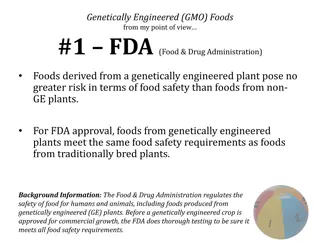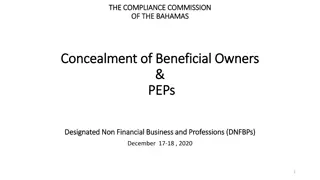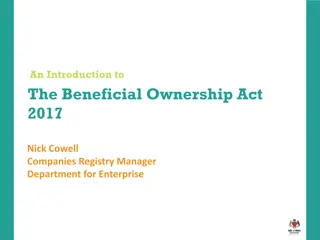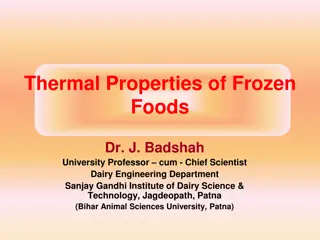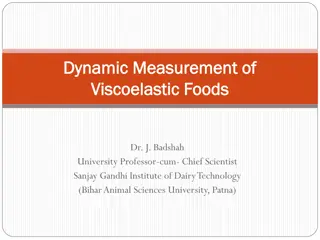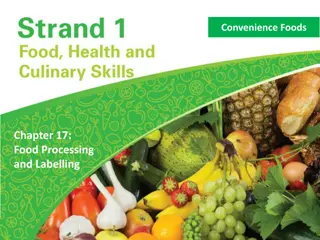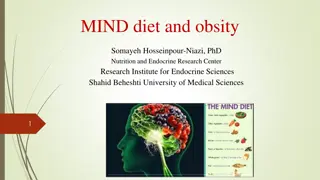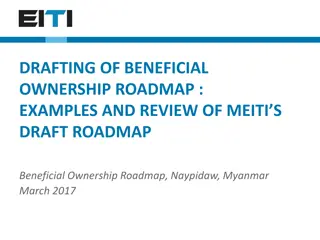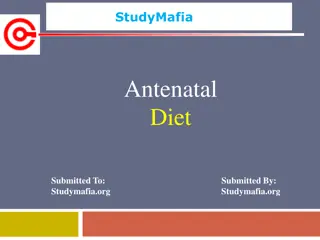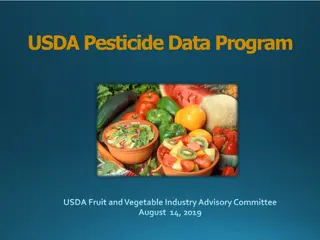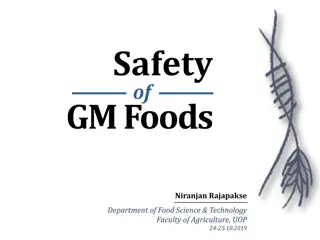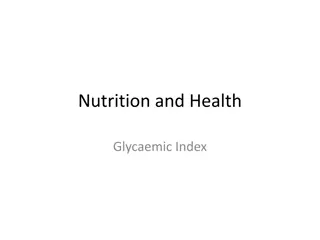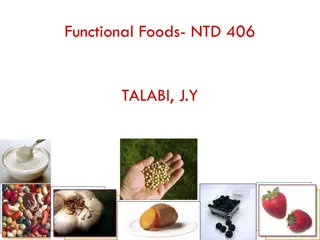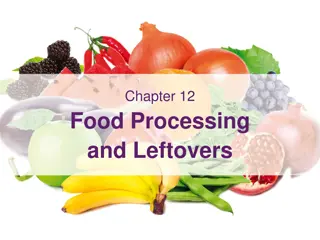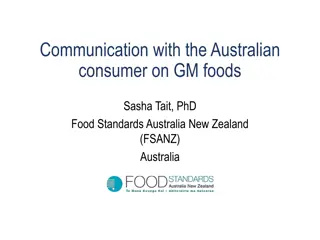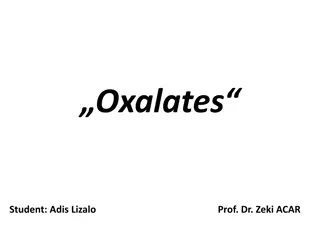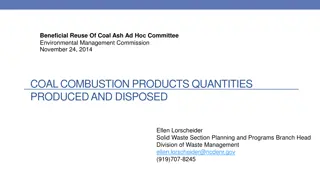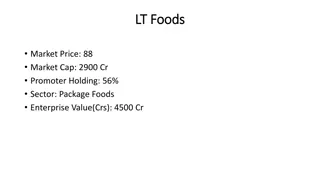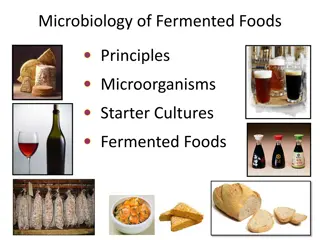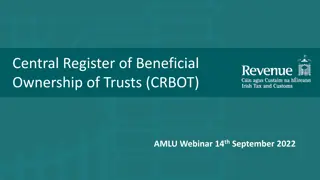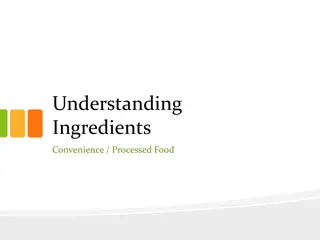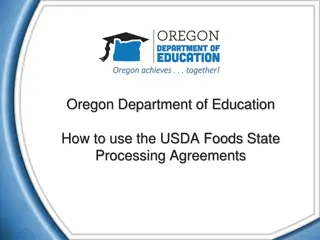Notification of Ministry of Public Health on Novel Food Regulations
This notification outlines the Ministry of Public Health's regulations on novel foods, including definitions, requirements, and examples. It also discusses food categories such as food supplements and special purpose foods, highlighting the importance of health-conscious consumer trends and the pote
2 views • 23 slides
Enhancing Beneficial Ownership Transparency: CIPC's Response to FATF Requirements
The Companies and Intellectual Property Commission (CIPC) in South Africa has taken significant steps to address deficiencies highlighted by the Financial Action Task Force (FATF) by establishing a Beneficial Ownership Register. Through this register, CIPC aims to collect accurate information on ben
1 views • 17 slides
BENEFICIAL OWNERSHIP TRANSPARENCY
South Africa's CIPC is addressing deficiencies in beneficial ownership transparency, as highlighted in the October 2021 Mutual Evaluation Report. The country faces increased monitoring due to being placed on the FATF Grey List. CIPC is mandated to establish a Beneficial Ownership Register to ensure
0 views • 16 slides
Effective USDA Foods Procurement and Forecasting Strategies
Managing USDA Foods procurement involves analyzing historical data, estimating future trends, and streamlining menu planning to save time and reduce costs. Standardized recipes and inventory management are crucial for efficient operations. Understanding the location and value of USDA Foods, along wi
9 views • 11 slides
Enhancing Anti-Money Laundering Laws for Beneficial Ownership Transparency
Presentation by AmaBhungane and Corruption Watch focuses on amending laws to define and disclose beneficial ownership in South Africa, emphasizing the need for clear definitions, low thresholds, and a risk-based approach. Recommendations include a consolidated register, stronger sanctions for compli
1 views • 9 slides
Understanding Genetically Engineered Foods: Perspectives and Insights
FDA ensures the safety of genetically engineered (GMO) foods, EPA reviews their environmental impact, farmers benefit from improved crop management, some consumers prefer non-GMO products, and nutritionally, GM foods are similar to non-GM. While scientific consensus supports the safety of GMOs, glob
1 views • 6 slides
Promoting Sustainable Local Foods for Nutrition Security in Nigeria
Food and nutrition insecurity in Nigeria is a pressing issue, prompting efforts to identify and promote locally available, nutritious foods. Stakeholder consultations in Sokoto, Kebbi, and Bauchi States highlighted the importance of staple crops like rice and millet, as well as bio-fortified crops.
0 views • 7 slides
Understanding Beneficial Ownership Requirements in EITI Standards
The EITI Standard requires countries to disclose the beneficial ownership information of oil, gas, and mining companies by January 2020. This includes details of the beneficial owner's identity, nationality, and any politically exposed status. Maintaining a public register of beneficial owners is re
0 views • 13 slides
Understanding Beneficial Ownership and DNFBPs in The Bahamas
Corporate vehicles play a crucial role in the global economy but are also misused for illicit activities like money laundering and terrorism financing. This presentation by The Compliance Commission of The Bahamas focuses on defining beneficial owners, meeting regulatory obligations, and addressing
0 views • 22 slides
Understanding the Isle of Man Beneficial Ownership Act 2017
The Beneficial Ownership Act 2017 in the Isle of Man aims to enhance transparency and information sharing, responsive to international requirements. It establishes a centralized database overseen by the Financial Services Authority, accessible only to designated officials for specified legal entitie
0 views • 20 slides
Enhancing Corporate Transparency and Compliance through Beneficial Ownership Regulations
The Companies (Amendment) Act, 2019 in Trinidad and Tobago has introduced regulations to enhance corporate transparency and compliance with CFATF recommendations by focusing on beneficial ownership. These regulations aim to combat money laundering and terrorist financing through requirements for com
1 views • 31 slides
Suspicious Activity Reporting & Beneficial Ownership System Guidelines
Learn about the dos and don'ts of reporting suspicious activities and transactions, understanding beneficial ownership, and the importance of secure search systems. Discover insights on submitting reports, maintaining integrity, and transitioning from reactive to proactive reporting in various secto
0 views • 15 slides
Thermal Properties of Frozen Foods: Importance and Modeling Equations
Understanding the thermal properties of frozen foods is crucial for ensuring food safety and quality. Dr. J. Badshah discusses the significance of freezing, reduction of microorganism activity, and the role of thermal properties like density, specific heat, and thermal conductivity. Freezing point d
0 views • 15 slides
Understanding Dynamic Measurement of Viscoelastic Foods
Viscoelastic foods exhibit time-dependent properties that can be measured using oscillatory mode in viscometers like cone and plate or parallel plate viscometer. The shear stress under oscillating mode provides insights into the material's viscosity and elasticity. Characteristics such as Wissenberg
0 views • 7 slides
Understanding Convenience Foods: Processing, Benefits, and Drawbacks
Convenience foods are processed products designed to save time and effort in meal preparation, ranging from frozen and canned goods to ready-to-eat meals. While they offer advantages such as convenience and variety, they also have disadvantages like additives and higher costs. This text explores the
0 views • 15 slides
The MIND Diet for Managing Obesity
Explore the MIND diet, a nutrition plan to support weight management by emphasizing brain-healthy foods. Learn about recommended foods like leafy greens, berries, nuts, olive oil, whole grains, fish, beans, and poultry, along with foods to avoid. This diet promotes cognitive health while addressing
0 views • 13 slides
Peanut Butter Beneficial For Weight Loss
Peanut butter can be a beneficial addition to a weight loss diet when consumed in moderation. It\u2019s rich in protein, healthy fats, and fiber, which help keep you feeling full and satisfied, reducing the urge to snack on unhealthy foods. These nut
1 views • 5 slides
Understanding Anti-Inflammatory Foods and Immune Function
Our health is closely linked to the gut microbiome, with fiber playing a key role in feeding beneficial gut bacteria. Incorporating anti-inflammatory polyphenols from plant-based sources like fruits, vegetables, and herbs can promote a healthier gut. Additionally, fermented foods act as natural prob
1 views • 8 slides
Developing a Beneficial Ownership Roadmap: A Comprehensive Guide
Explore the drafting and review process of a beneficial ownership roadmap with examples and insights from the Myanmar Extractive Industries Transparency Initiative (MEITI) draft. Covering key elements, activities, and improvements, this roadmap delves into capacity building, technical assistance, de
3 views • 14 slides
Antenatal Diet Recommendations for a Healthy Pregnancy
Learn about the essential dietary recommendations for a healthy antenatal phase, including caloric needs, fluid intake, beneficial foods to include, and foods to avoid. Follow these guidelines to support a well-balanced diet during pregnancy and ensure the optimal health of both mother and baby.
0 views • 18 slides
Guidance for Complementary Feeding in Infants
After 6 months of age, breastfed infants may struggle to meet their nutrient needs from milk alone, necessitating the introduction of complementary foods. Implementing guiding principles can help ensure optimal nutrition and growth, including exclusive breastfeeding for the first 6 months, practicin
0 views • 18 slides
Understanding Healthy Nutrition Choices
Healthy foods include a variety of nutrient-rich options such as fruits, vegetables, whole grains, lean proteins, and low-fat dairy products. Carbohydrate foods can be found in sources like fruits, whole grains, and legumes. Protein-rich foods include meat, fish, poultry, dairy, and plant-based prot
0 views • 14 slides
USDA Pesticide Data Program Overview
The USDA Pesticide Data Program (PDP) provides high-quality pesticide residue data for US foods to support regulatory decision-making and ensure food safety. Through cooperative agreements with participating states, the program conducts sampling of various commodities, including fresh fruits and veg
1 views • 17 slides
Understanding the Safety and Regulation of GMO Foods
Explore the importance of genetically modified organisms (GMOs) in healthcare, agriculture, and food industry, along with the safety concerns, regulatory assessments, and international standards associated with GMO foods. Learn about the benefits, potential risks, and management strategies for ensur
1 views • 21 slides
Understanding Glycaemic Index in Nutrition and Health
Glycaemic Index (GI) measures how carbohydrate-containing foods affect blood glucose levels. High GI foods raise blood glucose rapidly, while low GI foods release glucose gradually. Studies track impacts on blood glucose levels, insulin secretion, fat storage, and pancreatic function. High GI foods
0 views • 15 slides
Exploring Functional Foods for Health Benefits
Functional foods are dietary components consumed primarily for health reasons, providing benefits beyond basic nutrition. Types of functional foods include beans, berries, cruciferous vegetables, and cocoa products. Beans contain saponins that may help protect against cancers and lower cholesterol l
0 views • 24 slides
Food Processing and Leftovers: Understanding Preservation Techniques
Food processing plays a crucial role in preserving and extending the shelf life of foods. This chapter explores the advantages and disadvantages of food processing, the conditions microorganisms need to grow, various methods of food preservation, guidelines for freezing food, the significance of bla
0 views • 33 slides
Effective Communication Strategies on GM Foods in Australia
Sasha Tait from FSANZ addresses the challenges faced in communicating with Australian consumers on GM foods due to values-based opposition. The country's transparency initiatives include public consultations and responses, increasing awareness. Social media presence allows direct communication. Usin
0 views • 10 slides
Indiana 4-H Foods Project 2015 Overview
Indiana 4-H Foods Project 2015 aims to promote healthy food choices and habits among youth. The project includes fun activities like basic food prep, trying different foods, and conducting experiments. Various activity guides are structured based on grade levels and cover topics such as healthy food
0 views • 14 slides
Understanding Oxalates: Sources, Health Impacts, and Foods to Watch Out For
Oxalates are naturally occurring substances found in various foods and the human metabolism, with potential implications for kidney stone formation and calcium absorption. Foods high in oxalates include rhubarb, chocolate, berries, nuts, grains, and leafy greens like spinach. Managing oxalate intake
0 views • 9 slides
Beneficial Reuse of Coal Ash Ad Hoc Committee Report
The report discusses the beneficial reuse of coal combustion products, outlining various applications like soil nutrient additives, manufacturing materials, structural fills, and recovery of contained materials. It highlights different types of structural fills and their distribution by county in No
0 views • 12 slides
Understanding Beneficial Ownership in Oil, Gas, and Mineral Resources Governance
Beneficial Ownership (BO) is a crucial aspect of governance in the oil, gas, and mineral sectors. Requirement 2.5 of the global standards mandates disclosure of the natural person(s) who directly or indirectly ultimately own or control a corporate entity. Elements of BO include natural persons, owne
0 views • 22 slides
The Role of Beneficial Bacteria in Food Production
Beneficial bacteria play a crucial role in food production, aiding in the production of items like yogurt, cheese, pickles, and more. They also contribute to fuel production and help improve digestive health. These helpful microorganisms are diverse, with various strains serving different purposes i
0 views • 47 slides
Overview of LT Foods: Market Performance, Business Operations, and Future Potential
LT Foods, a prominent player in the packaged rice processing and export industry, boasts a strong brand portfolio including Daawat. With a focus on branded sales growth, reduction of debt, and product diversification, LT Foods is strategically positioning itself for future success. Recent developmen
0 views • 11 slides
Exploring the Fascinating World of Fermented Foods and Microorganisms
Unveil the intricate world of fermented foods, delving into the principles, microorganisms, and starter cultures involved. Discover the fine balance between spoilage and fermentation, the general properties and benefits of fermented foods, and the evolution of the fermented foods industry across tim
0 views • 16 slides
Corporate Transparency Act (CTA) Beneficial Ownership Reporting Requirements
The Corporate Transparency Act (CTA) mandates companies to report information about their beneficial owners to FinCEN starting January 1, 2024, to combat illicit activities. Reporting companies include U.S.-based corporations, LLCs, and foreign companies registered to do business in the U.S. Exempt
0 views • 10 slides
Understanding Central Register of Beneficial Ownership of Trusts (CRBOT) AMLU Webinar
CRBOT, established in accordance with EU AML regulations, aims to increase transparency in beneficial ownership of trusts. Trustees must maintain two registers with identical information and ensure due diligence in disclosing trust ownership. Designated persons have access to the register for checks
0 views • 10 slides
Understanding Customer Due Diligence and Proposed Federal Legislation
Explore the importance of Customer Due Diligence (CDD) for financial institutions in verifying beneficial owners and monitoring transactions. Learn about the requirements and deadlines set by the FinCEN and Department of Treasury. Additionally, delve into the details of the proposed Federal Legislat
0 views • 11 slides
Exploring Types of Convenience and Processed Foods
Convenience and processed foods offer time-saving benefits, ease of storage, and convenience for meal preparation. They come in various forms such as canned/bottled, frozen, and dried foods, each with specific advantages and preparation methods. Understanding these types of foods can help in making
0 views • 17 slides
Understanding USDA Foods State Processing Agreements in Oregon
The Oregon Department of Education works with state distributing agencies and school districts to leverage USDA Foods and convert them into convenient end products through processing agreements. Various levels of government can make regulations regarding nonprofit food service accounts, ensuring com
0 views • 13 slides





